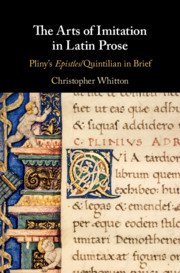Book contents
- The Arts of Imitation in Latin Prose
- The Arts of Imitation in Latin Prose
- Copyright page
- Dedication
- Epigraph
- Frontispiece
- Contents
- Ad lectorem
- Quintilian in Brief, in Brief
- Abbreviations
- Chapter 1 Two Scenes from the Life of an Artist
- Chapter 2 Setting the Stage
- Chapter 3 Brief Encounters
- Chapter 4 Dancing with Dialectic
- Chapter 5 Through the Looking-Glass
- Chapter 6 On Length, in Brief (Ep. 1.20)
- Chapter 7 Letters to Lupercus
- Chapter 8 Studiorum secessus (Ep. 7.9)
- Chapter 9 Docendo discitur
- Chapter 10 Reflections of an Author
- Chapter 11 Quintilian, Pliny, Tacitus
- Chapter 12 Beginnings
- References
- Index locorum
- Index of Greek and Latin Words
- General Index
Chapter 6 - On Length, in Brief (Ep. 1.20)
Published online by Cambridge University Press: 10 June 2019
- The Arts of Imitation in Latin Prose
- The Arts of Imitation in Latin Prose
- Copyright page
- Dedication
- Epigraph
- Frontispiece
- Contents
- Ad lectorem
- Quintilian in Brief, in Brief
- Abbreviations
- Chapter 1 Two Scenes from the Life of an Artist
- Chapter 2 Setting the Stage
- Chapter 3 Brief Encounters
- Chapter 4 Dancing with Dialectic
- Chapter 5 Through the Looking-Glass
- Chapter 6 On Length, in Brief (Ep. 1.20)
- Chapter 7 Letters to Lupercus
- Chapter 8 Studiorum secessus (Ep. 7.9)
- Chapter 9 Docendo discitur
- Chapter 10 Reflections of an Author
- Chapter 11 Quintilian, Pliny, Tacitus
- Chapter 12 Beginnings
- References
- Index locorum
- Index of Greek and Latin Words
- General Index
Summary
Epistles 1.20 is an unorthodox plea for length in court speeches. It is also one of the two salient peaks of ‘Quintilian in Brief’, a whole letter modelled, selectively and unpredictably, on Quintilian’s chapter on style (Institutio 12.10). This chapter reads it in detail, for argument and for intertexture, and shows that it is an imitative tableau of unusual complexity, focused on Institutio 12.10 but ranging widely across Quintilian’s work and looking through ‘windows’ to Cicero’s Brutus and Orator. The letter – addressed to Tacitus – also engages obliquely but closely with his Dialogus de oratoribus; Pliny’s anonymous interlocutor, I suggest, is a version of Tacitus’ Aper. A postscript on Epistles 1.21 reads this short note about buying slaves as a wry miniaturisation of Institutio 11, and sharp intertextual annotation of Epistles 1.20 and its virtuosic imitatio.
Keywords
- Type
- Chapter
- Information
- The Arts of Imitation in Latin ProsePliny's <I>Epistles</I>/Quintilian in Brief, pp. 192 - 248Publisher: Cambridge University PressPrint publication year: 2019

